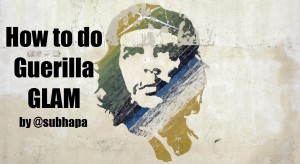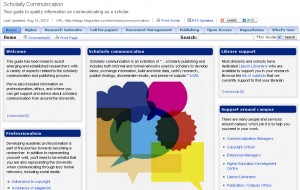Here is a round-up of events held at the University of Otago over Open Access Week.
Monday
Richard White, Manager Copyright and Open Access took a lunchtime session entitled Open Access What is it and Why Should I Care where he talked in some depth about the theory and practicalities of Creative Commons licences, described what OPen Access is, and the benefits and challenges of open access publishing for researchers. Richard’s slides are available here.
Richard launched the University of Otago Open Access Publishing Survey at the conclusion of his session. “This survey will give us a good sense of the extent to which Otago researchers are engaging with OA, their attitudes towards it and what support they need. Our results will be shared with the University community, including the University Research Committee.” A link to the survey has been emailed to staff. The survey is available here.
Tuesday
The Australasian Open Access Supporters Group held a Twitter Chat from 2-3pm. The archive can be read here. Main themes discussed were Open Access Mandates and the possibility of an Antipodean OA week at an earlier (less busy!) point in the year.
@antlion 1st step: awareness; 2nd step: mandate; 3rd step: advocacy; 4th step: actually enforcing the mandate? #AOASG #OAWeek
— Deborah Fitchett (@deborahfitchett) October 20, 2015
From 3-4pm Subhashish Panigrahi [@subhapa], based in Bangalore, described the concept of How to do Guerrilla GLAM. Given the emergence of Wikipedian in Residence projects overseas and at particular institutions in NZ (see a recent panel at NDF 2015), we were intrigued by what he had to say.
It was an interesting session which generated much discussion. For those of us in NZ where we are fortunate to have institutions where there is a relatively high rate of access to collections – I’m thinking even at the library catalogue level – the thought that guerrilla activity may be necessary to surface collection items without the intervention of institution staffers may be surprising and possibly confronting! Subhashish did stress this guerrilla activity in no way violates copyright or licencing agreements, but seeks to make cultural items in GLAMs openly available to the public, where possible by partnering with institutions. The fact that many institutions do not have the resources to digitize cultural items, he posits, leaves the door open for guerrilla activity by skilled volunteers.
One participant in the session succinctly described Guerrilla GLAM as being self-authorizing activity vs institutional authorizing activity. I understand this to mean that rather than institutions engaging their own staff or volunteers, or crowd sourcing new volunteers to digitise their content, the Guerilla GLAMers come to them. There may well be communities in NZ or small GLAMs that have no digital record of their collections. Communities and institutions in this situation may well find it helpful to engage some interested Guerrilla GLAMers to help them out.
- The webinar links and chat are available here connect.otago.ac.nz/p4j21g554ny/
- The slides are also available separately here http://slides.com/psubhashish/how-to-do-guerrilla-glam/fullscreen#/
Wednesday and Friday
The Being Open session, held on both Wednesday and Friday, comprised a number of short presentations about aspects of openness, topics included: Creative Commons basics, Data Management, OUR archive (Otago’s Institutional repository), Open Publishing, Open Educational resources (OERs), and tools for open scholarship (ORCiD, Academia and ResearchGate). The slides and accompanying notes are available here goo.gl/46imdE.




